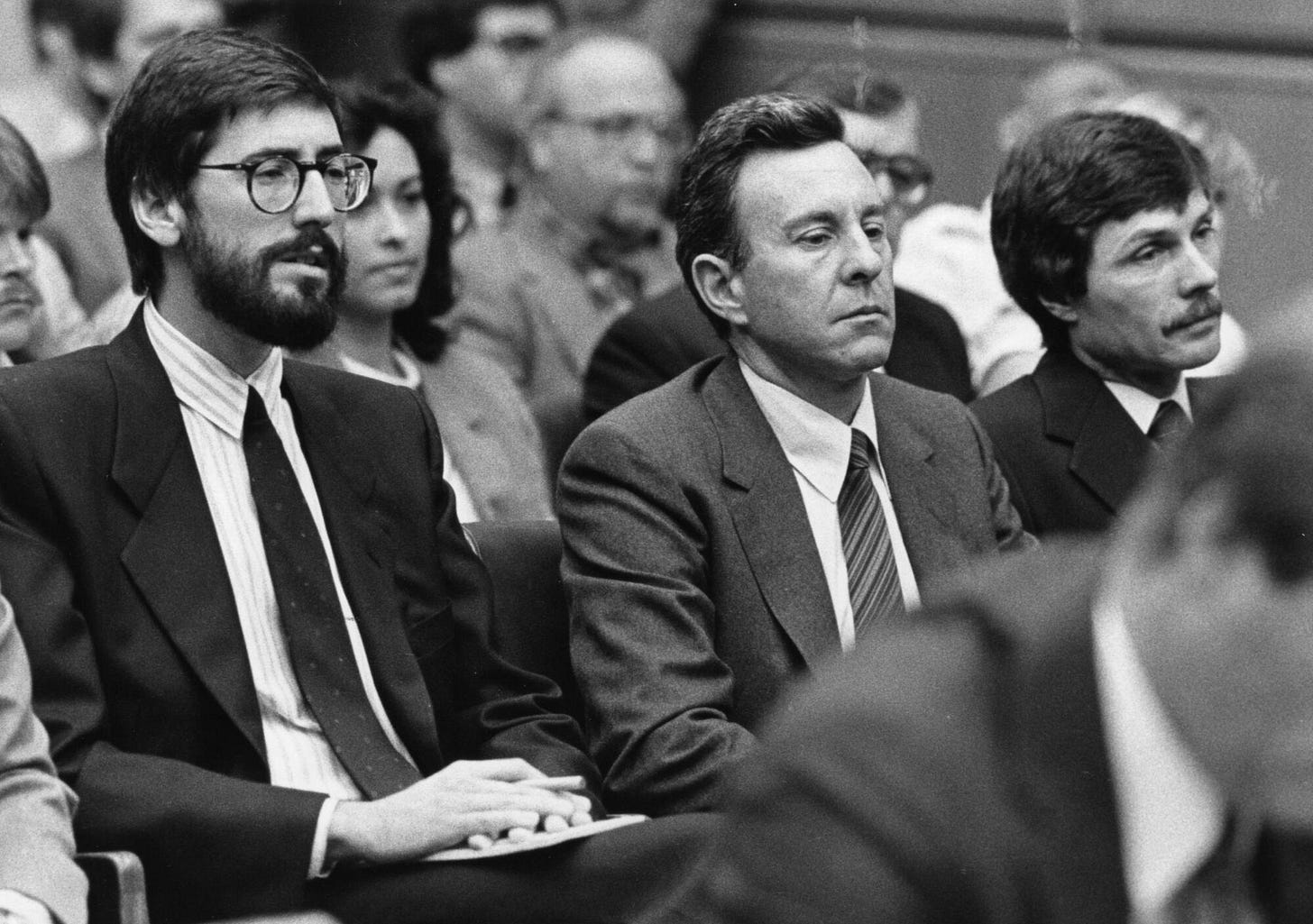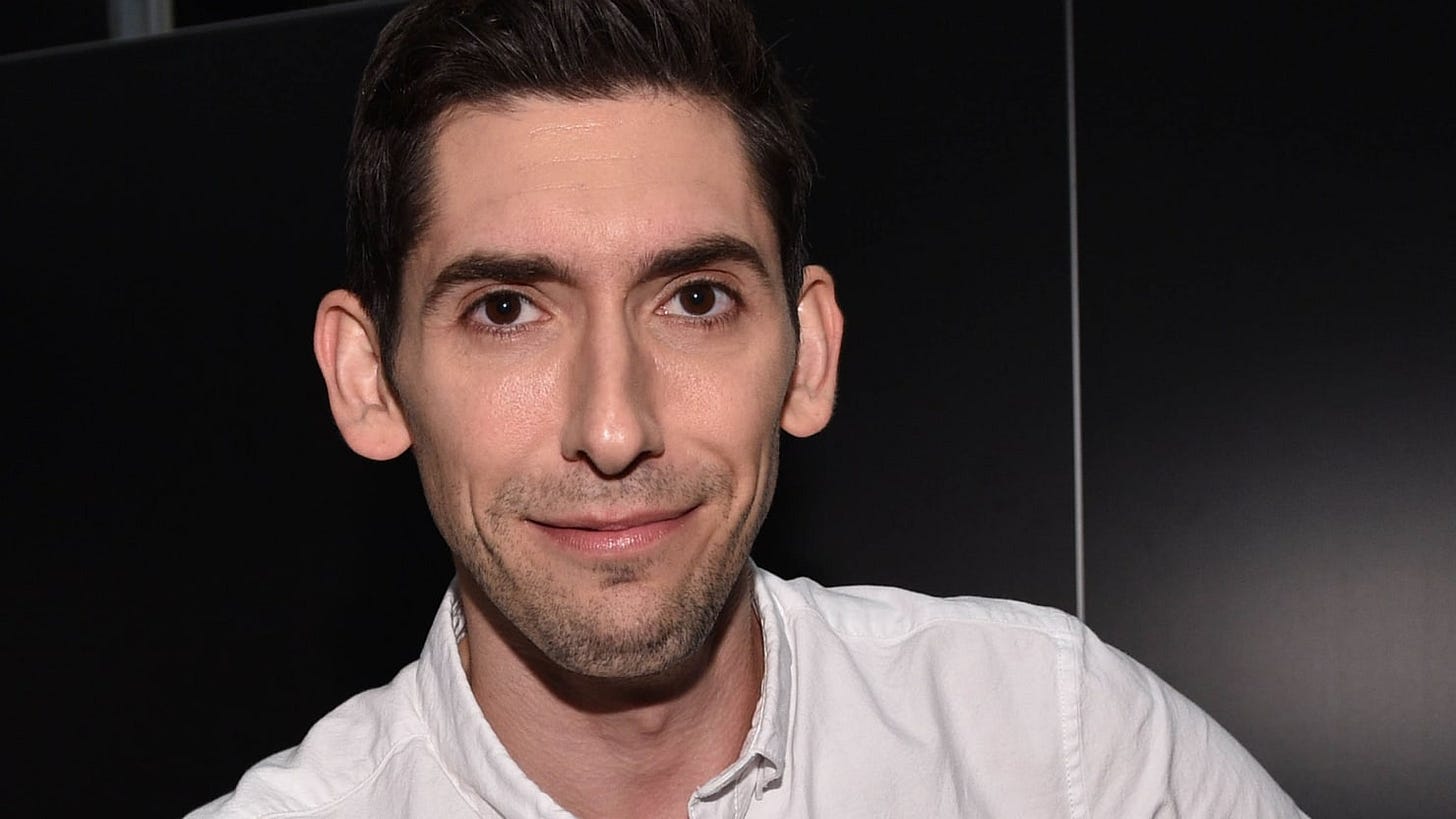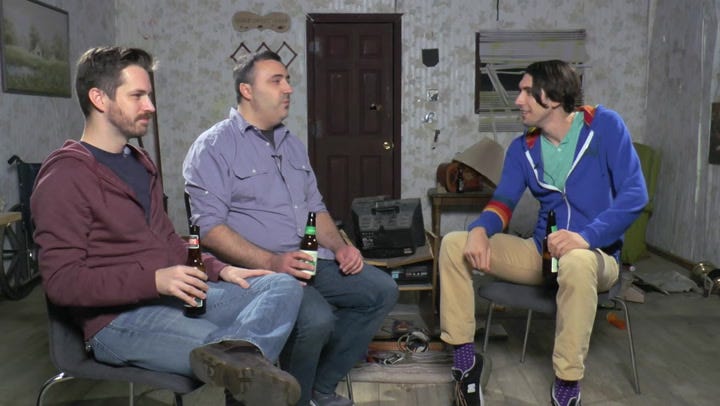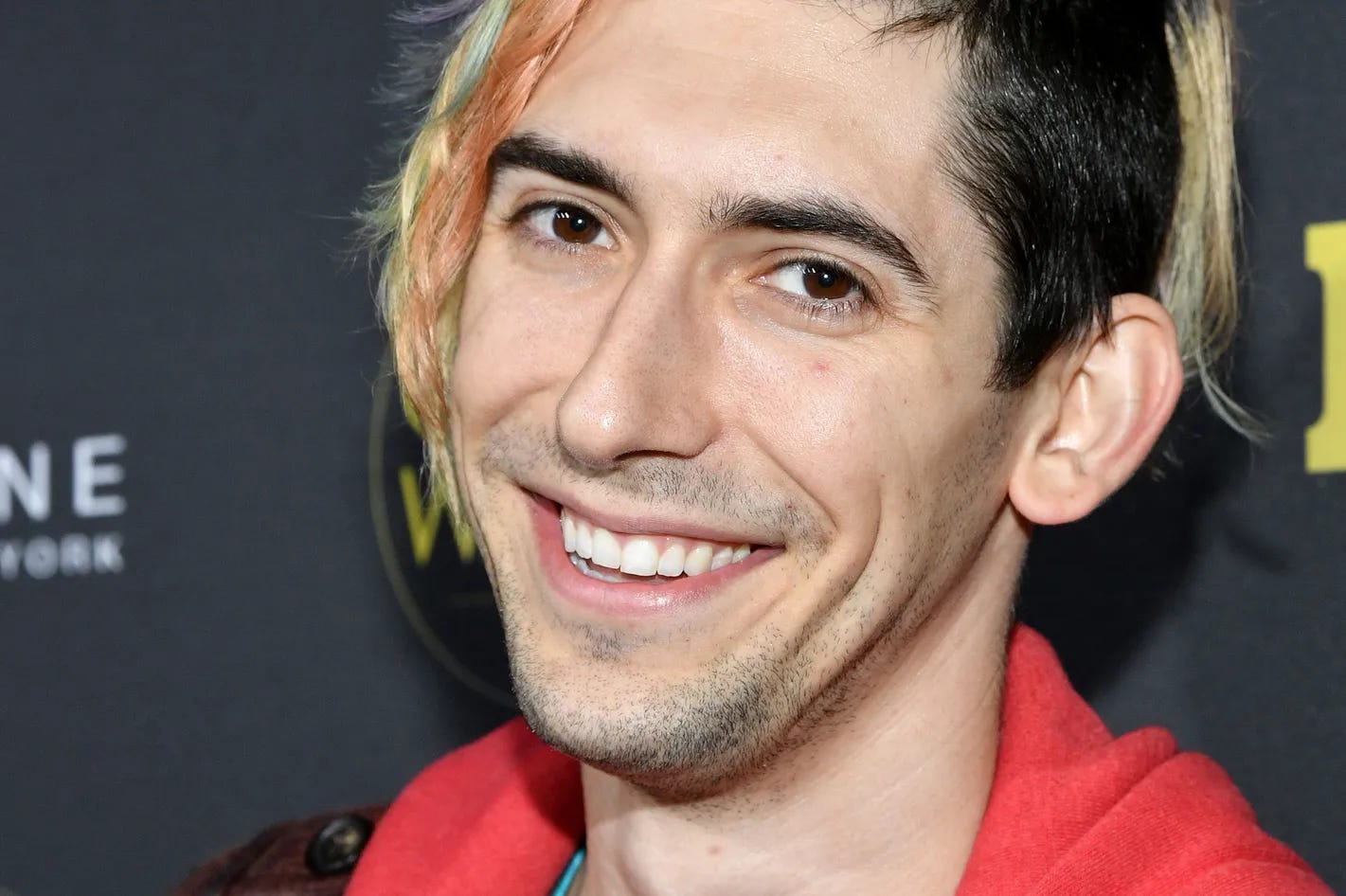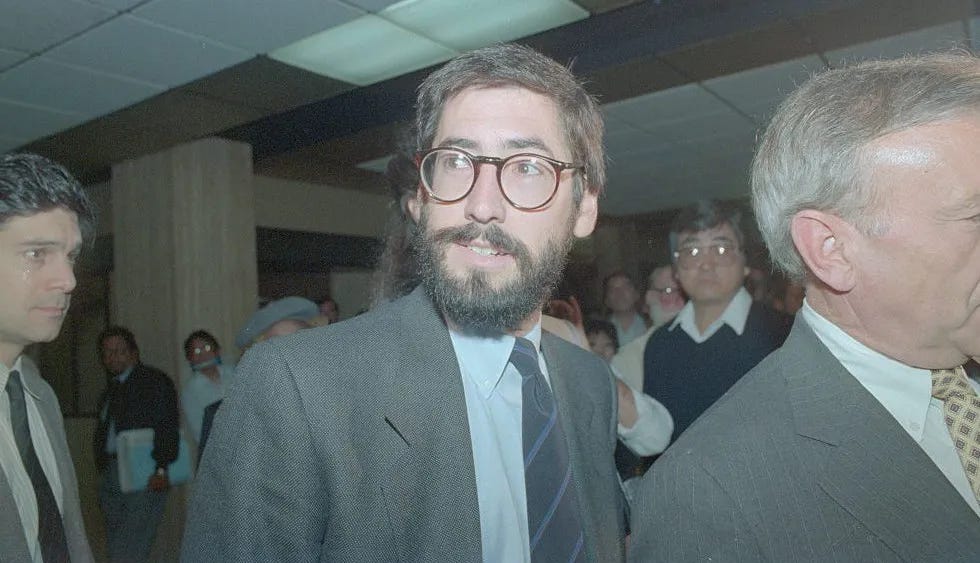Beware The Landises
Landises? Landi? Anyways, This is How the Father-Son Duo from Hell Put Hollywood on Trial
Over the years, I’ve had numerous times that I regrettably defended a problematic artist. In some cases, the revelations of their crimes hadn’t broken yet. Thankfully, the news of Louis C.K.’s flagrant sexual misconduct hit before I watched his skin-crawling directorial debut I Love You, Daddy and evangelized about what an audacious truth-teller C.K. was. In other cases, though, I should have known better.
I used to talk to the girls in my high-school Film Program about how Annie Hall is still the gold standard of romantic comedies, and what a genius Woody Allen was. Then I would have to clarify that I was just talking about Woody Allen the *filmmaker* and not Woody Allen the accused pedophile who married the adopted daughter of his longtime romantic partner. I used to imagine that convicted pedophile Roman Polanski wasn’t the same Roman Polanski who directed such formative movies such as Rosemary’s Baby and Chinatown. That he’d been transformed into a predator by the cumulative tragedy of his WW2-ravaged upbringing in Poland and the senseless murder of his pregnant wife, Sharon Tate, almost as if he was mutated into a sex fiend the way mad scientists turn themselves into monsters in hokey B-Movies. I couldn’t conceive that grotesque, reprehensible people made art that spoke to me.
It wasn’t just that I “liked” Annie Hall or Rosemary’s Baby, but I identified with their themes and their voice, that I had a relationship with them and, by extent, to the creeps who made them.
On that note, I was reflecting on a common question that I get asked at networking events: what’s a screenplay that you wish you had written? The easy answer, almost my default, was An American Werewolf in London. How could I go wrong with that?
David Naughton and Griffin Dunne as two unfortunate yanks in An American Werewolf in London
As a genre scribe, one who loves to infuse playful, irreverent humor with Old-School horror, An American Werewolf in London is almost my standard-bearer. It’s perhaps the most endlessly quotable werewolf movie ever written. “A naked American man stole my balloons,” “Beware The Moon,” etc. It also revolutionized genre filmmaking by blending seemingly incongruent tones into an irresistible blend of showstopping practical FX, classic werewolf mythology, and dry British wit.
The first draft of the script was penned by writer/director John Landis when he was just 19 years old. That made it not only an undeniably great work, but a success story that I’ve chased. So I was proud to introduce myself to people by instantly associating myself with John Landis. I mean, how could you blame me?
Oh, right. The Twilight Zone thing. Well, look, that was a tragic accident. Obviously. It was unavoidable. At least, if you believe the testimony of John Landis. Regardless, we have to separate the art from the artist, right? An American Werewolf in London is too important to me, to my identity as a writer.
For those of you who don’t know: in 1983, John Landis was directing a segment for the Twilight Zone feature film anthology. Coming off the critical and commercial success of three back-to-back hits: Animal House, Blues Brothers, and An American Werewolf in London, Landis ascended into the A-Tier and was now working on a major production that was produced by Steven Spielberg. He’d also directed the Thriller music video by that time. As much as it was an adaptation of a beloved television series, Twilight Zone: The Movie was a coronation for Hollywood’s next generation of auteurs.
Except, it didn’t quite work out that way. See, Landis’ segment, Out of Time, featured a bigoted man played by Vic Marrow who’s transported back to Nazi Germany to get a taste of his own medicine. Then he time-travels to Saigon during the Vietnam War, where he saves two Vietnamese boys from Yankee soldiers in a moment of redemption.
The late Vic Morrow in Twilight Zone: The Movie
At least, that’s how it was supposed to play out. But due to gross negligence and/or criminal misconduct, a stunt involving a helicopter went fatally wrong, killing actor Vic Morrow and the two boys. Chen was crushed by the helicopter while Morrow and Dinh Le suffered an even more grotesque fate: they were decapitated by the helicopter blades.
Landis, along with others on the production, was charged with manslaughter. It was the first time a film director was put on trial for an on-set fatality. While a director isn’t in charge of managing safety conditions, many on the crew testified that Landis was negligent towards the safety hazards on set and was complicit in violating labor laws. He told the producers to pay the two underage actors under the table because child labor laws would have never allowed the production to film so late, or to be involved in such a dangerous stunt. According to the crew, Landis joked “We’re all going to jail!” before they started filming. Vic Morrow’s last words were that he “never should’ve agreed” to such a dangerous stunt.
Still, Landis was accused of manslaughter and not of criminal negligence or breaking labor codes. So, in a controversial decision, Landis was officially acquitted and went right back to work in Tinsel Town, where he was welcomed back with open arms. Landis even took a victory lap a year later when he had an “Anniversary Party” to celebrate his acquittal with those who stood by him throughout the scandal.
As with any other court case involving a powerful, influential man of industry, Landis’ acquittal was taken as a green light for the powers that be to continue employing him. He made another hit with Coming to America before his career fizzled out in the ‘90s. To reiterate, his career didn’t stall because three actors (two of whom were children) died on one of his sets, but because Beverly Hills Cop III underperformed at the box office.
I’ll be honest, the more I learned about the details of the case, the harder it was to have an American Werewolf in London poster on my wall. My opinion of the film didn’t change, but my relationship with it did. The way I championed it, the way I weaved it into my personality and my creative voice. The fact that it took me so long, that it took so much reluctant research on my part to stop making excuses for its director.
Then learning about Landis’ personal conduct before and after the trial cemented it. We’re jaded to the criminal misconduct of Hollywood’s elites by now. Who would be surprised to hear that last year’s Oscar winner, or last week’s SNL host, had groomed a young fan or had cannibalistic tendencies? We’re bombarded with headlines like that all the time, and it’s almost a statistical certainty that one of those exposed celebrities was somebody you admired, maybe loved.
John Landis on trial for manslaughter, the first time a director had ever been charged for a fatal accident on a film set
My disappointment in Landis turned to disgust when I heard of the “eulogy” Landis gave at Morrow’s funeral, despite the protests of Morrow’s family. Instead of taking ownership or expressing the bare minimum level of remorse, Landis said, “Tragedy can strike in an instant, but film is immortal. Vic [Morrow] lives forever. Just before the last take, Vic took me aside to thank me for the opportunity to play this role.”
I’m sure that’s what Vic Morrow was thinking as the helicopter crashed upon him: how grateful he was to John Landis.
Reading about the Twilight Zone accident will make you hate John Landis, but it’ll also make resent the entire generation of auteurs that welcomed him back into their community. The controversy always lingered in Landis’ reputation and it still stains his name to this day. Eddie Murphy made a particularly tasteless reference to the tragedy when he told reporters that he wouldn’t work with Landis again after Beverly Hills Cop III, stating “[Landis] has a better chance of working with Vic Morrow.”
The thing is, as I started to get self-righteous about all the people who were complicit in Landis’ comeback, I realized that I’d been complicit in my own way. Critics, audiences, and just about anybody who supports the movie industry has the chance to cast a vote on who we elevate and who we hold accountable. Not everyone’s vote is weighed the same, of course. Moviegoers aren’t the ones who make hiring decisions.
Still, we have the soft power of voicing our support, or our fury, towards the John Landises of the world. I’m not going to say that anybody who owns a copy of An American Werewolf in London has condoned manslaughter. I have a copy of the movie, and I would be lying if I didn’t say it was a personal favorite.
I can still refuse to ignore or apologize for the crimes of its director. Even if he made a movie that I really, really like.
Flash forward to the 21st century. John Landis hasn’t made a feature film since 2010, and he hasn’t had a hit since 1988. While he was never held legally accountable for the Twilight Zone accident, and he was never exiled from Hollywood, John Landis is someone you didn’t have to think about. You can watch Trading Places without even having to spend a single thought on him, really.
Then, another Landis emerges. Enter Max Landis, son of John Landis and a wunderkind of screewriting. I first became aware of Max Landis the way most folks did, when he helped pen the screenplay for the found-footage-superhero movie Chronicle. A modest hit, Chronicle launched Landis’ career in Hollywood and made him an in-demand screenwriter who wrote American Ultra, Victor Frankenstein, and Bright.
Max Landis: screenwriter of Chronicle and biggest sleazeball of every ComicCon
The weird thing was that being a successful screenwriter only seemed to be part of Max Landis’ job. He sold a record number of scripts by the age of 30, but more than that, Max Landis was a pop-culture guru who was a mainstay of internet culture for the entirety of my high-school years. In my memory, Max Landis wrote a number of blockbusters and was a true Golden Boy, but his output was actually quite underwhelming. Chronicle was his only hit and arguably the only thing he put his name on that wasn’t an abject failure. Well, unless you count Bright, which Netflix swore was one of their highest-performing originals. That claim has been dwarfed by the storm of bad press surrounding that movie, but we’ll get to that.
Max Landis was an anomaly in the largely anonymous world of screenwriting in that his force of personality eclipsed his actual body of work. Opinionated, hyperactive, and savvy of Internet culture, Landis would appear on major YouTube channels like Screen Junkies, Honest Trailers, and most notoriously Red Letter Media. There, he did both a Best of the Worst episode and a sit-down interview with co-hosts Mike and Jay about the state of the film industry.
This is where my relationship with Max Landis is completely inverted from my impression of his Dad. While I loved many of John Landis’ films but had little if no impression of him as a person, I had little love for any of Max’s projects but had many, many thoughts about him as a human being. The sad, messy truth is that I had a sort of begrudging affinity for Max circa 2014 as he turned the role of screenwriting into a celebrity brand and used his clout to call out Hollywood’s dwindling creative drive. I wasn’t nearly as invested in all the geek shit that he was, but Max had a serious passion and undeniable knowledge of pop culture, mixed with his terminally-online brand of millennial humor. That’s not to say that he didn’t have baggage.
Max was no stranger to controversy and almost seemed to thrive in it. He faced backlash when he accused Rey, the heroine of Disney’s Star Wars trilogy, of being a “Mary Sue.” He also passive-aggressively blamed audiences for the failure of American Ultra.
Beyond that, Max Landis was just a little weirdo who treated his celebrity status like it was a toy store, and turned every little thought of his into performance art. He had a YouTube channel were he would rant about geek shit, share his thoughts on screenwriting, and pitch ideas for movie sequels that nobody was asking for. He would also pull weird stunts like uploading the first 4 pages for his Fantastic Four spec script right after his Chronicle director, Josh Trank, released the ill-fated Fant4stic. Obnoxious? Absolutely. Proudly so. It was also the exact kind of petty that I would exercise if I was a multi-millionaire screenwriter.
Max Landis sitting down with Jay Bauman and Mike Stoklasa in a now-unlisted interview for the Red Letter Media YouTube channel
Even if I wasn’t a fan of Max as a writer, I had the sense that he was making screenwriting important to people. He provided genuine insight into the state of the entertainment, industry, albeit in his self-centered fashion. For all my problems with him, it was also easy to imagine that Max, barely old enough to run for Senate, could mature into a major talent. That he would be worth the trouble of having around.
It looked like the prophecy of Max Landis would come full circle when it was announced that he would write and direct a remake of his father’s best movie, An American Werewolf in London. He sold a script to Netflix for over $3,000,000, he was attached to a dozen high-profile films on IMDb. He seemed unstoppable.
Then in 2019, two years after his biggest payday in the form of Netflix’s Bright, The Daily Beast published a damning article in which 8 women claimed that Max Landis sexually and emotionally abused them. Rumors of Landis’ pattern of physical and emotional abuse towards women circulated in Hollywood for years, something he exacerbated by gross remarks he made in interviews. In 2013, he said he considered it a “privilege” to “hook up” with him, so who could be surprised that he turned out to be a sex pest? Thankfully, The Daily Beast article broke through.
Unlike John Landis, whose career survived his scandal, Max saw instant and decisive consequences for his misconduct. He was dropped by his representation, his pending projects were stalled, and he was publicly denounced by his peers. The aforementioned Josh Trank said that he believed the allegations “100 %” and that he had barred Max Landis from the Chronicle set.
The Boy Genius who was poised to be Hollywood’s Next Big Thing was being held accountable. He wasn’t punished to the full extent of the law, but his glory days were over. It was the peak of #MeToo, when it seemed that the tide finally turned on these men who could get away with anything. Harvey Weinstein, Kevin Spacey, and now Max Landis were persona non grata who would trouble moviegoers no more. Red Letter Media even went so far as to unlist all their videos featuring Landis, including a fan-favorite episode of Best of the Worst that introduced them to the filmography of Neil Breen.
Max Landis sporting a particularly infamous haircut
Now the young Landis spends his time vlogging and appearing on podcasts, where he can pitch his truly insufferable script for the American Werewolf remake. One in which he would’ve MaxLandified the character of David into a prick who cheats on his girlfriend. Aw man, you’re telling me *that* movie won’t happen?
Max also shot a series of, er, performance art pieces in which he does a one-man rendition of episodes from D.C. mythology. I guess? Don’t ask me to watch the many, many hours of this, please.
In one of his post-cancellation ventures, Max Landis made a promo for his Masterclass-style service, where he consults with young writers about how they too can succeed as a professional screenwriter by, uh, being the son of a famous movie director? Again, I’m just guessing.
The most striking aspect of his little promo video is how Landis, who used to style himself as flamboyantly millennial, was now presenting himself more conservatively with a trimmed beard, spectacles, and formal attire. He looks eerily similar to his father, especially in this courtroom photo of Old Man Landis.
John Landis leaving the courthouse after being acquitted of manslaughter
Max Landis making some weird, self-indulgent “pitch” on his YouTube channel
So Max Landis realized his family destiny, but in a sicker way I could’ve imagined. A young, enthusiastic filmmaker with cutting-edge humor has become a disgraced little miscreant who smirks at the camera.
In some ways, the story of this Father/Son Duo from Hell could reveal how the film industry has changed for the better. John Landis’ career might’ve been affected by the Twilight Zone disaster, but he still continued to work with A-List talent for major studios and collecting ungodly paychecks. The consequences of his son’s indiscretions, however, were swift and undeniable.
The Story of John Landis reveals that the film industry used to operate as something of a Frat House for Director, where loyalty to your buddies was more important than the safety and wellbeing of others. John Landis wasn’t the first man to endanger people on one of his film sets, nor was he the last. Still, the shocking nature of the Twilight Zone accident and Landis’ subsequent return to Hollywood helped shed light on just how much this fraternity of filmmakers enabled each other.
The Story of Max Landis revealed how the #MeToo era dramatically changed the culture of Hollywood, both the internal politics of accountability and the public-facing nature of backlash. Had the Daily Beast article broken in the pre #MeToo Era, it’s easy to imagine Max Landis weathering the controversy after the public discourse moved on.
Instead, Max Landis was cast out and received the banishment his father never got, proving just how much progress the entertainment industry has made over the decades. Perhaps so, but that’s not the whole story.
Contextualizing this saga reveals a more nuanced, sobering truth that gets to the heart of just how deep-rooted the evils of mediocre men are within power structures. Max Landis was “canceled” because the culture was at an inflection point and because the testimony of the eight women was so damning. Max’s squirmy self-defense against the allegations and public outcry, which he refers to as his “shaming,” didn’t help his case. The thing is, there were rumors of Max’s toxic behavior ever since he broke through with Chronicle. Josh Trank kept Max Landis off of the Chronicle set for a reason, after all. Unfortunately, that didn’t stop Max from rubbing elbows with the Kingmakers of Hollywood.
Yet, none of those rumors and whispers about Max Landis’ abuses didn’t do anything to slow down his career. For that matter, that didn’t give pause to any of the nerd-culture content creators who publicly associated with Max, even as they routinely gave his movies terrible reviews. Was it that Max had undeniable charisma, or that they wanted to be friendly with John Landis’ kid?
Most importantly, Max Landis’ continued exile isn’t assured. It was announced late last year that Deeper, a spec script that Max sold almost a decade ago, is now back in development with Tom Cruise attached. In a world where Donald Trump can get re-elected president after January 6th, Landis could secure a comeback if he has another hit. Evil doesn’t die, it just lurks about, waiting for us to lower our guard and strike again.
While most can agree that what happened on the set of the Twilight Zone movie was unforgivable, John Landis still hasn’t had his feet held to the fire. Filmmakers of any generation have continued to celebrate his films and, knowingly or not, sanitized his legacy. Is everyone under the obligation to mention the Twilight Zone accident when they quote Animal House to their buddies? No, the films themselves aren’t guilty of John Landis’ crimes and there’s nothing intrinsically wrong with enjoying a piece of entertainment.
John Landis at a film festival and not in jail for getting three people killed
Still, those who know better have an obligation to contextualize Landis’ legacy properly. If you were to just go off of YouTube reviewers, John Landis almost sounds like a fun uncle of ‘80s cinema, the kind of clever filmmaker that we need more of today.
We don’t need any more Landises, be they Johns or Maxes.
John Landis didn’t just implicate himself, he implicated his fellow directors and revealed the callous attitude filmmakers had toward their cast and crew. There’s no end to stories of directors letting their egos run amok and abusing their team, but Landis took the stereotype to its darkest extreme and revealed the danger of enabling artists.
Max Landis, in turn, implicated an entire subculture that’ll turn a blind eye to heinous behavior as long as you hate the Star Wars sequels or have a really, really cool idea for Ghostbusters III. As “geek culture” continues to be co-opted by reactionaries, Max’s downfall reads more like foreshadowing.
I still wrestle with my relationship to works by problematic artists, but I know the boundary has to start with the artists themselves. No movie is worth dying for, and no director/writer/actor/whatever is worth apologizing for.
So, in short: Beware The Moon. And, most importantly, Beware The Landises.







